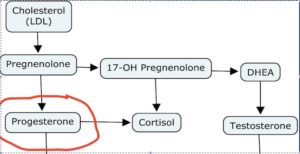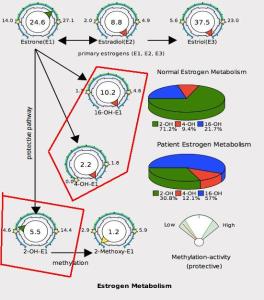Five Steps to Balancing Your Hormones Are you suffering from any of the top 16 signs of hormonal imbalance: Millions of people suffer from these types of problems, but why? Because many people mistakenly think they can be healthy simplygoing to their routine doctors visits, eating less and moving more. If it was only that simple!
Many people mistakenly think they can be healthy simply going to their routine doctors visits, eating less and moving more. If it was only that simple!
Your body is a complex network of organs and glands that communicate with one another using hormones. These hormones are intended to influence specific functions such as digestion, metabolism, appetite, sleep, activation of the immune system, and reproduction and tissue repair. For various reasons your organs and glands may become weak or damaged and overtime, and as that specific organ and hormone system spiral out of balance, your symptoms can worsen. This is why some people, regardless of their diet and exercise habits, feel lousy, while others do nothing at all and feel great.
The symptoms of hormonal imbalance are often treated with medications. Unfortunately, these medications don’t get to the root cause of these problems. Without addressing the root cause of these problems and merely treating the symptoms, your overall health will continue to decline and can lead to more and more medications. Our clinic specializes in ending this general decline by detecting which organs and glands are not functioning properly and “why”the organs and glands may not be functioning correctly, leading to your symptoms.
In this article we have outlined for you some strategies to getting your health back on track.
An unhealthy diet high in sugar can result in inflammation and weight gain that may contribute to PMS and hormonal imbalances. Sugar causes an increased production in the hormone insulin. Insulin, when too high, can result in damage to the arteries and vessels of the body and brain. Insulin also unfavorably alters the estrogen and progesterone ratio. The imbalanced ratio of estrogen and progesterone leads to many of the symptoms women experience.
More often than not in our clinic, after testing, we find women who have a hormone deficiency of progesterone and an excess amount of estrogen. Taking birth control pills or other medications containing estrogen can result in elevated estrogen. Excess estrogen is linked to PMS as well as stroke, uterine fibroids, ovarian cysts and an increased risk of breast cancer. Abnormally high levels of estrogen can cause emotional symptoms such as irritability and aggression in addition to many physical PMS symptoms.
Another contributing factor of imbalanced progesterone/estrogen levels is stress. Stress causes the depletion of the hormone progesterone while increasing the long-term stress hormone cortisol. As you can see in the image below, as the body makes more cortisol it leaves less progesterone to be available for use.

Stress also depletes your levels of serotonin and dopamine which are two neurotransmitters responsible for mood-enhancing. These neurotransmitters are also responsible for alleviating PMS and hormonal symptoms such as breast pain, digestive upset, cravings, depression, anxiety, poor concentration and lack of motivation. Stress also raises the hormone aldosterone which contributes to water retention and magnesium loss. Advanced testing that looks at your cortisol and progesterone levels can lead to a clear understanding of what could be causing your problems and what specific treatments would be most effective in helping you.
You’ve probably heard people say, “You are what you eat”, but in our office we like to say, “You are what you absorb”. Many of our patients have imbalanced gut flora which can lead to malabsorption of foods. What causes imbalanced gut flora? The use of antibiotics, NSAIDS (non-steroidal anti-inflammatory drugs), parasites, viruses, alcohol, yeast or candida overgrowth, food sensitivities, processed sugar enriched “Franken” food and stress. Deficiencies that have been researched resulting in hormonal imbalances are magnesium, vitamin B6, calcium, folic acid and essential fatty acids. An organics acid nutritional test can help you discover which nutrients are deficient and allow us to create a customized protocol based on your unique needs.
Every hormone in the body is made from fats and proteins assimilated and released by the liver. When the liver gets bogged down with medications, toxins, debris and other metabolic waste it cannot keep up with the production and elimination of the hormones in the body. This lack of detoxification and formation of hormones results in hormonal imbalances. I have helped hundreds of patients improve their hormonal health by enhancing liver health. This is done by improving the levels of nutrients that help with detoxification and the formation of hormones.
One study performed by the JNCI of Monographs published, “The tissues of women with breast cancer may have 10 to 50 times the level of plasma concentration of estrogen. This suggests estrogens are not properly detoxified, and therefore, accumulate in the breast tissue. These levels will increase the risk of breast cancer.” There are hundreds of articles that illustrate that cancer can be caused from estrogen, but this study points to the fact that estrogen causes cancer if it is not properly detoxified.
In our office we actually have the ability to test if you have excess estrogens that are not being properly detoxified that could be leading to your hormonal imbalances. Notice in the picture below how this young woman’s estrogens are high. She suffers from exceptionally heavy periods that last 7-10 days and she has terrible cramping. The 16-OH and 4-OH are especially important because these two types of estrogen have clinical research showing a link to breast cancer, and the 2-OH has research showing it helps prevent cancer.

Unfortunately this young woman is not in a good situation, because imbalance in these hormones. But after appropriate diet changes and nutritional support she has shifted these test results to a more favorable ratio of these hormones and she is now having completely normal menstrual cycles.
We are helping many patients discover they have an undiagnosed thyroid condition. Underactive thyroid disease is being missed with standard laboratory testing (evaluation of only the TSH and T4 hormones) and should be considered as a possible cause of PMS symptoms. Progesterone, the same hormone that if deficient causes PMS, is also necessary for healthy thyroid gland function. Many low thyroid symptoms can mimic and cause PMS symptoms.
Unfortunately so many people turn to hormonal treatments (i.e. bio-identical, birth control, HRT), pain, anxiety and depression medications, and even surgical interventions to improve their symptoms. Because these interventions fail to address the true cause of hormonal imbalance, many continue to suffer and in many cases their conditions worsen which can lead to more serious disease and illness.
I recommend you take a more holistic, natural approach to balancing your hormones and seek help from a board certified functional medicine practitioner (C.F.M.P.) who is trained to look at all aspects of your health that can affect your hormones. With our help you will be able to get treatments designed specifically for you and your condition.
To get started we offer a complimentary consultation, call us at 734-779-1650 or click the link below.

Dr. Josh Shields D.C., C.F.M.P is the clinic director and owner of Integrative Wellness Centers, The Top-Rated Naturopathic & Functional Medicine Doctors in Michigan. He is a board certified functional medicine practitioner (1 of only 8000 in the U.S.) and has traveled the country as a consultant and educator of functional medicine for other professionals. Dr. Shields is recognized as an industry leader for pioneering and developing natural programs geared toward helping people reverse chronic disease and helping “healthy” people who want to become healthier. Don’t be surprised if you see doctors from other clinics spending the day and doing rounds trying to discover why Dr. Shields’ care is so effective.Dr. Shields has been helping patients for over thirteen years and has helped more than 2,000 patients successfully. Dr. Shields has been featured as an expert on several health and wellness topics for fortune 500 companies like GE capital and Comerica Bank. He is also a registered speaker for the American Diabetes Association.He and his wife have 3 children and currently live in the Novi, Michigan area.
To watch Dr. Shields own testimonial and why Integrative Wellness Centers was founded click this VIDEO button.

Take the online digestive evaluation to instantly discover what systems of your body are the cause of your health issues.
Online Digestive EvaluationTake the TestOnline Female Hormone EvaluationOnline Male Hormone Evaluation